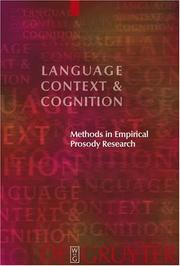| Listing 1 - 3 of 3 |
Sort by
|

ISBN: 9783110188561 3110188562 3110914646 9783110914641 9783110914641 Year: 2006 Publisher: Berlin De Gruyter
Abstract | Keywords | Export | Availability | Bookmark
 Loading...
Loading...Choose an application
- Reference Manager
- EndNote
- RefWorks (Direct export to RefWorks)
Der Sammelband vereinigt eine Reihe aktueller Beiträge zu methodologischen Aspekten der empirischen Prosodieforschung. Experten des Fachs diskutieren eine Vielzahl unterschiedlicher Ansätze zur Gewinnung, Analyse und Interpretation prosodischer Daten und illustrieren diese anhand ihrer eigenen Forschungsfragen und -ergebnisse. Die einzelnen Arbeiten behandeln die Auswahl und Messung prosodischer Parameter, die Etablierung prosodischer Kategorien, die Annotation gesprochener Sprache sowie experimentelle Methoden für Produktions- und Perzeptionsexperimente (u.a. die Konstruktion des Stimulusmaterials, Präsentationsmodi, die Vor- und Nachteile von Online- und Offline-Studien, Bewertungsskalen, die Weiterverarbeitung der Daten und ihre statistische Analyse). Somit dient der Band als Handbuch, das die Gewinnung von Sprachdaten mit ihrer Interpretation verknüpft und es Linguisten und Wissenschaftlern angrenzender Disziplinen erlaubt, für ihre empirische Forschung fundierte Entscheidungen zu treffen und deren Konsequenzen abzuschätzen. This book contains a collection of cutting-edge papers on methodological aspects of prosody research. Current approaches to the gathering, treatment, and interpretation of prosodic data are discussed by experts in the field, illustrated by their own empirical research. Contributions focus on the choice and measurement of prosodic parameters, the establishment of prosodic categories, annotation structures for spoken-language data, and experimental methods for production and perception studies (including the construction of materials, modes of presentation, online vs. offline tasks, judgement scales, data processing, and statistical evaluation). The volume will serve as a handbook linking data collection and interpretation, allowing researchers in linguistics and related fields to make more informed decisions concerning their empirical work in prosody.
Phonetics --- #KVHA:Taalkunde --- #KVHA:Prosodie --- Prosodic analysis (Linguistics) --- Research --- Methdodlogy. --- Grammar, Comparative and general --- Methodology. --- Phonology. --- Phonology --- Multidimensional phonology --- Polysystemic phonology --- Prosodic phonology --- Speaking styles --- Linguistics --- Research&delete& --- Methdodlogy --- Philology --- Grammar, Comparative and general Phonology --- Accoustics. --- empiricism. --- intonation (language). --- phonology. --- prosody.
Book
ISBN: 3961101272 3961101280 9783961101276 Year: 2019 Publisher: Berlin Language Science Press
Abstract | Keywords | Export | Availability | Bookmark
 Loading...
Loading...Choose an application
- Reference Manager
- EndNote
- RefWorks (Direct export to RefWorks)
Advances in Formal Slavic Linguistics 2016 initiates a new series of collective volumes on formal Slavic linguistics. It presents a selection of high quality papers authored by young and senior linguists from around the world and contains both empirically oriented work, underpinned by up-to-date experimental methods, as well as more theoretically grounded contributions. The volume covers all major linguistic areas, including morphosyntax, semantics, pragmatics, phonology, and their mutual interfaces. The particular topics discussed include argument structure, word order, case, agreement, tense, aspect, clausal left periphery, or segmental phonology. The topical breadth and analytical depth of the contributions reflect the vitality of the field of formal Slavic linguistics and prove its relevance to the global linguistic endeavour. Early versions of the papers included in this volume were presented at the conference on Formal Description of Slavic Languages 12 or at the satellite Worksh
Linguistics --- Slavic languages. --- Linguistic science --- Science of language --- Language and languages --- Slavic Languages
Book

ISBN: 3110515857 3110517876 9783110517873 9783110517880 3110517884 9783110515824 3110515822 9783110515855 9783110515855 Year: 2017 Publisher: Berlin Boston
Abstract | Keywords | Export | Availability | Bookmark
 Loading...
Loading...Choose an application
- Reference Manager
- EndNote
- RefWorks (Direct export to RefWorks)
The present volume offers a selection of papers on current issues in Slavic languages. It takes stock of the past 20 years of linguistic research at the Department of Slavic Studies at Leipzig University. Within these two decades, the scientific writing, teaching, and organization done in this Department strengthened the mode of research in formal description of Slavic languages, formed another center for this kind of linguistic research in the world, and brought about a remarkable amount of scientific output. The authors of this volume are former or present members of the Department of Slavic studies or academic friends. Based on the data from East, West, and South Slavic languages, the papers tackle issues of all grammatical subdisciplines in current models of description, compare parts of the grammars of Slavic languages, explain categories and phrases in Slavic languages that do not exist in present-day Indogermanic languages of Western Europe, and propose ways how to update the standard of lexicography in still less described Slavic languages. A study of language competence is dedicated to the actual requests on heritage speakers and shows how their abilities can be evaluated. The present volume offers a selection of papers on current issues in Slavic languages. It takes stock of the past 20 years of linguistic research at the Department of Slavic Studies at Leipzig University. Within these two decades, the scientific writing, teaching, and organization done in this Department strengthened the mode of research in formal description of Slavic languages, formed another center for this kind of linguistic research in the world, and brought about a remarkable amount of scientific output. The authors of this volume are former or present members of the Department of Slavic studies or academic friends. Based on the data from East, West, and South Slavic languages, the papers tackle issues of all grammatical subdisciplines in current models of description, compare parts of the grammars of Slavic languages, explain categories and phrases in Slavic languages that do not exist in present-day Indogermanic languages of Western Europe, and propose ways how to update the standard of lexicography in still less described Slavic languages. A study of language competence is dedicated to the actual requests on heritage speakers and shows how their abilities can be evaluated.
Linguistics. --- Linguistic science --- Science of language --- Language and languages --- Grammar. --- Slavic Studies.
| Listing 1 - 3 of 3 |
Sort by
|

 Search
Search Feedback
Feedback About UniCat
About UniCat  Help
Help News
News